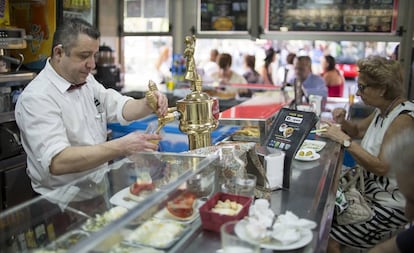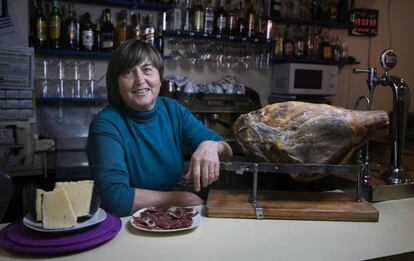Is Spain still the land of bars on every street corner?
Statistics show that the number of drinks establishments has been declining in the country for seven years in a row


It is a commonplace belief that Spain is the “land of bars,” yet this is increasingly less so, according to the Spanish Hospitality Federation.
Last year, the number of drinking establishments fell for the seventh year in a row to 184,430. Since 2010, Spain has 18,269 fewer bars, and the trend will continue this year.
Hospitality is a sector with a social role
Emilio Gallego, Spanish hospitality federation
The industry blames not just the recent economic crisis, but also demographic shifts such as the rural exodus and an aging population.
Despite this, the hospitality industry as a whole – which also includes restaurants and hotels – continues to grow, with 5,000 new openings in 2017.
Emilio Gallego, secretary general of the Spanish Hospitality Federation, and its president, José Luis Yzuel, explain what they feel are the causes behind the drop in that staple of traditional Spanish lifestyle: the bar de barrio.
“The property bubble led to a reshuffle of city residents. The new neighborhoods attracted people, and establishments moved there, while traditional bars in areas with aging populations shut down,” says Gallego.

“Those new establishments are generally larger and their offerings are more oriented to a new consumer,” he adds, illustrating his point with the case of Las Tablas, a relatively new residential area with many food and drink options.
As for the older businesses, “unless they change and attract a new crowd, their future is very bleak,” notes Yzuel.
“And then there is the demographic decline in rural areas. The local bar used to provide many services – it was a general store, it sold lottery tickets – but if there’s no more people in the village, the bars end up closing,” adds Gallego.
Both experts also pointed at the rise of franchises against the decline of independent businesses.
Employment
Gallego and Yzuel underscore that the hospitality industry is a major source of jobs in Spain. According to statistics from the EPA workforce survey, in 2017 there were an average 1,637,100 workers in the hospitality sector, representing a 2.1% rise from the previous year and accounting for 8.7% of the entire Spanish workforce.
“Hospitality is a sector with a social role,” says Gallego, noting that the industry hires young people, immigrants and other social groups with high unemployment rates.
However, these jobs are highly seasonal and 39.3% of workers were on temporary contracts in 2017, compared with the average of 26.7% for the entire workforce.
English version by Susana Urra.









































